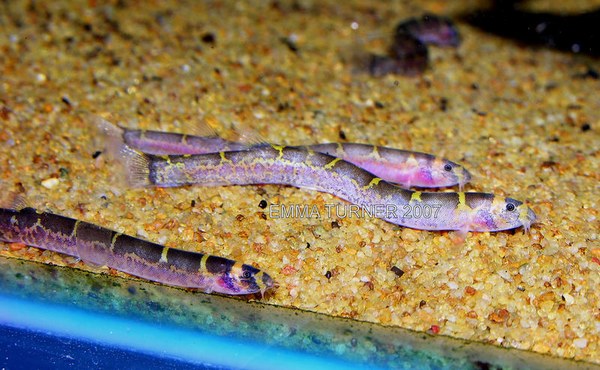Pangio alternans
Summary

Scientific Name: Pangio alternans (Kottelat & Lim, 1993)
Common name: Borneo Kuhli Loach
Synonyms: None
Distribution: Mahakam basin, Kalimantan Timur, Borneo, Indonesia
Sexual Dimorphism: Females noticeably plumper when loaded with eggs like other Pangio species.
Maximum size: 3 inches
Similar to: Might be confused with other striped kuhlis, except for lateral dappling.
Care: All kuhlis need well-established aquaria and should not be considered for newly set up tanks. Lots of hiding places with soft substrate. Best kept in groups, the larger the better. Three fish is the absolute minimum that should be kept together.
Feeding: Easily fed. Accepts good quality flake, sinking pellets, thawed frozen bloodworm, Mysis shrimp, brine shrimp, etc.
Water parameters: pH: 6.2-6.8. Hardness: Medium Soft to Medium. Max dh: 10
Temperature: 78 - 82ºF (25.5 - 28ºC)
Breeding: Has not been bred in aquaria.
Notes
Little is known about this species normal habitat. The original specimens described by Kottelat & Lim were discovered in blackwater conditions in a fast-flowing tributary stream under forest cover. It was not known if the speed of the water was seasonal or just caused by a lowering of water level in the main Mahakam River. The fish were found in leaf litter at the sides of the stream.
Pangio alternans is distinguished anatomically by having less vertebrae than other kuhli species (45 - 48), but for the aquarist the most discernable identifier is the unique patterning. The short saddles on the dorsal surface stop far shorter than in other striped kuhli species and meet a broad band of mottled markings that are either side of the lateral line and may extend down to the belly.
Kuhlis are great at getting into awkward places. Undergravel filters are less in vogue these days, but aquarists occasionally stripped down tanks that they had previously kept kuhlis in only to find a population that had obviously bred in the tank hidden beneath the undergravel plate.
Photo Gallery
Click to view all images of this species! |
Document Actions

